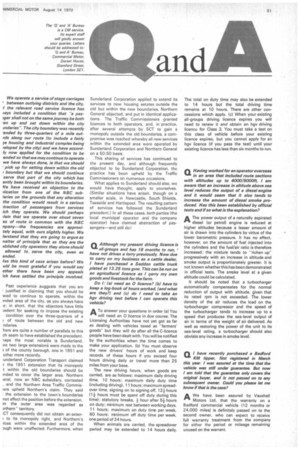We operate a service of stage carriages ' between outlying
Page 53

If you've noticed an error in this article please click here to report it so we can fix it.
districts and the city, 1 the relevant road service licence has rays included a condition that "a pas?ger shall not on the same journey be both 'en up and set down within the city rndaries". The city boundary was recently ended by three-quarters of a mile outrds along our route (to include a fairly 7e housing and industrial complex being 'eloped by the city) and we have accord/v now now applied for the condition to be ended so that we may continue to operate we have always done, ie that we should
• pick up for setting down within the old I boundary but that we should continue serve that part of the city which has ently been brought within its boundaries. ife have received an objection to the dication from one of the NBC subiaries on the grounds that any alteration the condition would result in a serious traction of passengers from services ich they operate. We should perhaps Plain that we operate over about seven es of route in common with the NBC npany—the frequencies are approxitely equal, with ours slightly higher. We lerstand that they are going to argue as natter of principle that as they are the ablished city operators they alone should allowed to, serve the city, even as ended.
las this kind of case arisen before? We uld be most grateful if you would say ether there have been any appeals ich have settled the principle involved.
Past experience suggests that you are justified in claiming that you should be wed to continue to operate. within the mded area of the city, as you always have e; in short, that the objectors have little :.edent for seeking to impose the existing condition over the three-quarters of a of route between the old and new ndaries.
here are quite a number of parallels to this ch seem to have established the precedent. laps the most notable is Sunderland. :re two large extensions were made to the i of the county borough. one in 1951 and other more recently.
underland Corporation Transport claimed r the 1951 extension that its monopoly t within the old boundaries should be inded to cover the larger area. Northern Feral, now an NBC subsidiary, contested , and the Northern Area Traffic Commislers upheld Northern's claim. They said the extension to the town's boundaries not affect the position before the extension. :n the outer area was regarded as )1-them" territory.
CT consequently did not obtain an exteni to its monopoly right, and Northern's flees within the extended area of the Nigh were unaffected. Furthermore. when Sunderland Corporation applied to extend its services to new housing estates outside the old but within the new boundaries, Northern General objected, and put in identical applications. The Traffic Commissioners granted licences to both operators, and, in practice, after several attempts by SCT to gain a monopoly outside the old boundaries, a compromise was reached whereby all new services within the extended area were operated by Sunderland Corporation and Northern General on a 50:50 basis.
. This sharing of services has continued to the present day, and although frequently objected to by Sunderland Corporation. the practice has been upheld by the Traffic Commissioners on numerous occasions.
What applies to Sunderland should also, we would have thought, apply to yourselves. (Similar situations have arisen, though on a smaller scale, in Newcastle. South Shields. Teesside and Hartlepool. The resulting pattern of services has followed the Sunderland precedent.) In all these cases. both parties (the local municipal operator and the company operator) have claimed abstraction of passengers—and still do!




























































































